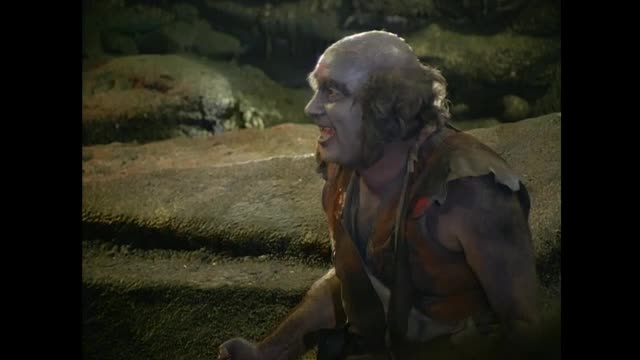During a poor and unhappy childhood, Stewart turned to singing which he later recalled ‘gave me an identity’. He studied electrical engineering at Waco, Texas, before moving to New York to study at the Juilliard School with Mack Harrell, making his operatic stage debut as La Roche / Capriccio in the first American performances of this opera at Juilliard in 1954. During the same year he appeared with the New York City Opera in various small roles and as the Commendatore / Don Giovanni; and with the Chicago Lyric Opera as Baptista / The Taming of the Shrew (Vittorio Giannini), Raimondo / Lucia di Lammermoor and Angelotti / Tosca. In 1955 he married Evelyn Lear, a fellow student at Juilliard.
Roles became hard to come by and by 1956 Stewart was ready to give up singing professionally. He was about to take a post with IBM when he and his wife learnt that they had been awarded Fulbright scholarship to study in Berlin from 1957. Within a few weeks of their arrival in Germany he was contracted to the Berlin Städtische Oper (later the Deutsche Oper) making his debut as The Minister / Fidelio in 1957. His roles with this company, of which he was a member until 1964, included Golaud / Pélleas et Mélisande, Orfeo / Orfeo ed Eurydice (Gluck), Escamillo / Carmen and, in two notable world premieres, William in Boris Blacher’s Rosamunde Floris and Jupiter to Lear’s Alkmene in Klebe’s opera of that name.
Stewart’s international career began with his 1960 debut at the Royal Opera House, London as Escamillo. He returned to Covent Garden often, to sing Gunther / Götterdämmerung under Solti (1963), Orest / Elektra under Kempe (1965), the title role in Der fliegende Holländer with Schmidt- Isserstedt (1972) and Golaud with Colin Davis (1974 and 1978). Also in 1960 he made his debut at the Bayreuth Festival, as Amfortas / Parsifal, which he sang there until 1972. He became a mainstay of the Wagner festival, singing Donner / Das Rheingold (1960–1961, 1965–1969, 1972), Gunther (1960–1961, 1965–1969, 1972), the Dutchman (1965, 1971), Wolfram / Tannhäuser (1966–1967) and the Herald / Lohengrin (1968); and, most notably, in Der Ring des Nibelungen Wotan / Das Rheingold and Die Walküre (1967–1972) and the Wanderer / Siegfried (1969–1972). At the Paris Opera his debut came in 1964 as Gunther.
In 1962 Stewart appeared for the first of many occasions at the San Francisco Opera as Rodrigo / Don Carlo, Valentin / Faust and Ford opposite Sir Geraint Evans’s Falstaff. Later roles included Yeletsky / The Queen of Spades, Germont père / La traviata, the Count / Capriccio and Le nozze di Figaro, Golaud, Orest and, in 1971, the title role in Eugene Onegin with Lear as Tatyana. One of his finest San Francisco interpretations was as Reimann’s Lear, in 1981.
Initial approaches from the Metropolitan Opera, New York were refused, as Stewart wished to appear there on his own terms. This he did with success in 1966 as Ford opposite Tito Gobbi’s Falstaff. He continued to appear at the Met through to 1993 in numerous roles, including Wolfram, Wotan, the Dutchman, Amfortas, Orest, Kurwenal / Tristan und Isolde, Golaud, the Figaro Count, Jochanaan / Salome, Balstrode / Peter Grimes, the four villains / Les Contes d’Hoffmann, Sachs / Die Meistersinger von Nürnberg, the Music Master / Ariadne auf Naxos and the Speaker/ Die Zauberflöte (his final role at the Met).
Between 1967 and 1973 Stewart took part in Herbert von Karajan’s Easter Festival at Salzburg. His beautifully smooth baritone voice and imaginative and individual interpretation of Wagner’s texts particularly appealed to Karajan, who named Stewart as his preferred Wotan. Other notable assumptions were the title role in Hindemith’s Cardillac at Santa Fe in 1967 and the Dark Fiddler in Delius’s A Village Romeo and Juliet at Washington DC in 1972, both American premieres. Following their retirement Stewart and his wife, in partnership with the Wagner Society of Washington, established a progamme to assist young singers.
The possessor of an extremely mellifluous voice, quite without any of the vocal problems frequently found in the repertoire which he performed, Stewart looked commanding on stage and proved to be an effective actor. His recordings, mainly of the Wagner repertoire, are outstandingly good, especially his interpretation of Hans Sachs.
© Naxos Rights International Ltd. — David Patmore (A–Z of Singers, Naxos 8.558097-100).
| Title | |
| WAGNER, R.: Rheingold (Das) (1978) | |

|
WAGNER, R.: Rheingold (Das) (1978)
Composer:
Wagner, Richard
Artists:
Altmeyer, Jeannine -- Berlin Philharmonic Orchestra -- Esser, Hermin -- Fassbaender, Brigitte -- Finnila, Birgit -- Hendrikx, Louis -- Kanel, Vladimir de -- Karajan, Herbert von -- Kelemen, Zoltan -- Modl, Martha -- Moser, Edda -- Nienstedt, Gerd -- Randova, Eva -- Rebmann, Liselotte -- Ridderbusch, Karl -- Roar, Leif -- Schreier, Peter -- Stewart, Thomas -- Stolze, Gerhard
Label/Producer: UNITEL |
